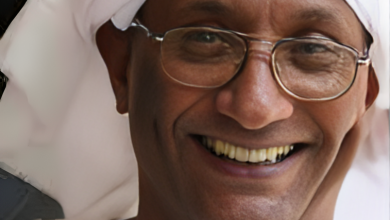Max Weber on Khartoum: Democracy or the State? (2-2)

By: Abdullah Ali Ibrahim
In a recent interview with Fareed Zakaria on CNN, Mina Al-Araibi, editor-in-chief of The National magazine in Abu Dhabi, came up with an idea about American policy in the Arab region that is useful in analyzing the raging war in Sudan. She mentioned America’s current confrontations with non-state armed groups (the Houthis, the Iraqi Popular Mobilization Forces, Hezbollah) to say that America must prioritize the existence of the nation-state itself over anything else in its foreign policies. The benefit of this phrase for Sudan in its ongoing war is great because even the most optimistic people are almost convinced that the state of Sudan is about to collapse soon.
It is not clear in American policy that it has made the state the center of its foreign policy circle. When President Biden said that “global politics is a conflict between liberal democracy and tyranny,” America placed democracy in that position, whether it succeeded in the endeavor or not. In dealing with these non-state armed entities, it was satisfied with carrots and sticks. It calls the group a terrorist group, imposes a boycott on it, and then leaves the stick to the carrot at the appropriate time. It imposed a boycott on the Houthis, then retracted it in January 2017, seeking to accompany them in peace efforts in Yemen.
Here, Max Weber, the German sociologist (D. 1920), may help us in looking at the Sudanese conflict, which is no longer related to the democratic transition in America’s policy towards us. The most optimistic of us see in the ongoing war the ruin of the Sudanese state.
Weber defined the modern state as “a human society that claims a monopoly on the legitimate use of physical force in a given society.” The army in such a country is responsible for managing this legitimate violence. The Sudanese army’s argument for its legitimacy in the state without the “Rapid Support Forces (RSF)” is conclusive, even if the “RSF” claims legitimacy through a law issued by the same country. The state’s “RSF” authorization to use physical violence by law during the Darfur war and other matters falls within its jurisdiction as well. The use of this violence by a group such as “RSF” can only be done with the permission of the state. The state, according to Weber, is the source of the right to use violence. Accordingly, it differs from gangs and various protection agencies in two ways: the monopoly on violence, on the one hand, and the right to assign whomever it deems appropriate, such as “RSF,” to use violence on its behalf. Thus, it spoils the popular saying that RSF is related to the army because it emerged from its womb in the well-known phrase.
The demand for democracy in the state here lags behind the demand for the existence of the state itself, according to Weber. By defining the state as a monopoly on the legitimate use of force on bodies, Weber ended the tradition of his predecessors to study the state with an eye toward its moral goals. A humanitarian sociologist like him, in his words, is concerned with the facts of this society and the reality of the state’s monopoly on weapons in it. It is not his job to decide the morality of this use of state power. For him, the state is not defined by its goals, i.e., its projects, but rather by the means that are specific to it alone, and by which it invokes the legal use of force. Democracy, no matter how much we praise it, is a moral value without which the state might be established. Whenever people exist in the state, they come up with various projects, democracy is not the best of the worst systems, except one. There is a dictatorial state, populism, popularism, socialism, etc., and even democracy itself in the state has a wide spectrum: liberalism, illiberalism, social democracy, presidential and parliamentary. The state, by definition, is the right to use violence. The monopoly on violence is linked to people’s demand for the order. If the state is unable to control, or participates equally in it, such as “RSF,” “the concept of the state evaporates and chaos prevails.”
Democratic transition is no longer a reality of the Sudanese war today. It is not possible to secure it by returning to the security and military reform plan over which the war was carried out due to a dispute between the army and the “RSF.” The RSF itself is now broadcasting from above its ranks in the military field that it wants a new army that takes ethnic and regional diversity into account. This is a common criticism of the army for its belief that the elite of its officers are dominated by the northern and central Nile regions. The army’s demand is to reinvent the army, contrary to what the RSF agreed upon in the framework agreement in December 2022, which stipulated its integration into the army, sooner or later. This call is not far from Bremer’s call in Iraq to disband the Baath Army and rebuild it from the beginning . When we learned that the RSF and groups from the Forces of Freedom and Change (FFC) called the army the “Army of the Kizan,” meaning the army of the ousted Ingaz regime, the result of what happened to the Iraqi army is identical to the one, which is going to happen to the Sudanese army.
The reality of the war that pities Sudanese and observers of Sudanese affairs is the evaporation of the state and the prevalence of chaos. It is a warning that America can remedy once it moves from an effort to spread democracy to an effort that clings to the existence of the state in Weber’s definition of it, which is its monopoly on legitimate physical violence, the management of which it delegates to its army. Democracy is “can be caught up” as we say. In this response, America needs the advice of Howard French, an academic and journalist at Foreign Policy, to prepare itself in African politics, whose crises are being reproduced from a history that few have listened to. In other words, it means engaging with the world as it is, not as it should be.



